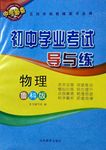题目内容
______ he had broken the record, he would be a world-famous runner now.
A. When B. Because C. If D. Though
C
【解析】略

 七星图书口算速算天天练系列答案
七星图书口算速算天天练系列答案 初中学业考试导与练系列答案
初中学业考试导与练系列答案After my dad died on Aug.30, 2001, my mother made sure we marked each anniversary. At first, my brothers and sister and I would travel hours to get home, but eventually we got to the point where just one or two of us would make it back to go to Mass with her and spend the day together.
The great love of her life, the man who broke up with her right before her college graduation, only to return two years later claiming he’d traveled the world and hadn’t found anyone to compare with her, remained a daily presence in her life. She spoke about him so often and kept his memory so alive that people were sometimes surprised to learn that he was gone. She took over the garden where he’d planted and made it her own.
When the 10th anniversary of his death approached, my mom began talking about it and planning for it weeks in advance. The date on her kitchen calendar was circled and marked R.I.P. (Rest in Peace). Of course she wanted all of us there and settled the dates for our coming back.
On Monday — the day before the anniversary — she went to morning Mass and walked downtown for lunch with friends, and later told my sister on the phone that she felt Dad still so close that as she was walking back home, she heard someone yell and thought, “Oh, there’s Dick.”
That evening she went out to water flowers, just as my father, 10 years before, had gone out to the garden to pick vegetables before he died. A neighbor heard the tin watering can strike the ground as she fell and hit her head. My mother died within hours, on Aug.30, 2011, the 10thanniversary. She needed to mark that anniversary, she wanted us all home and my dad had waited long enough.
【小题1】From the second paragraph we know that the author’s father______.
| A.traveled around the world and left her mother |
| B.left her mother first but returned two years later |
| C.had a quarrel with her before her graduation |
| D.was not the right man her mother wanted at that time |
| A.knew her last day was coming on Aug.30 |
| B.kept everything of her father’s home |
| C.missed Father though he had passed away |
| D.remained a daily presence in his life |
| A.Mother died the day before the anniversary of Father’s death |
| B.Mother died in the garden as Father did ten years ago |
| C.Mother died because she fell to the ground accidentally |
| D.Mother died on the same date when Father did ten years ago |
| A.She wanted us to stay at home. | B.Mother missed us very much. |
| C.Mother expected us to get back. | D.That day was her last day. |